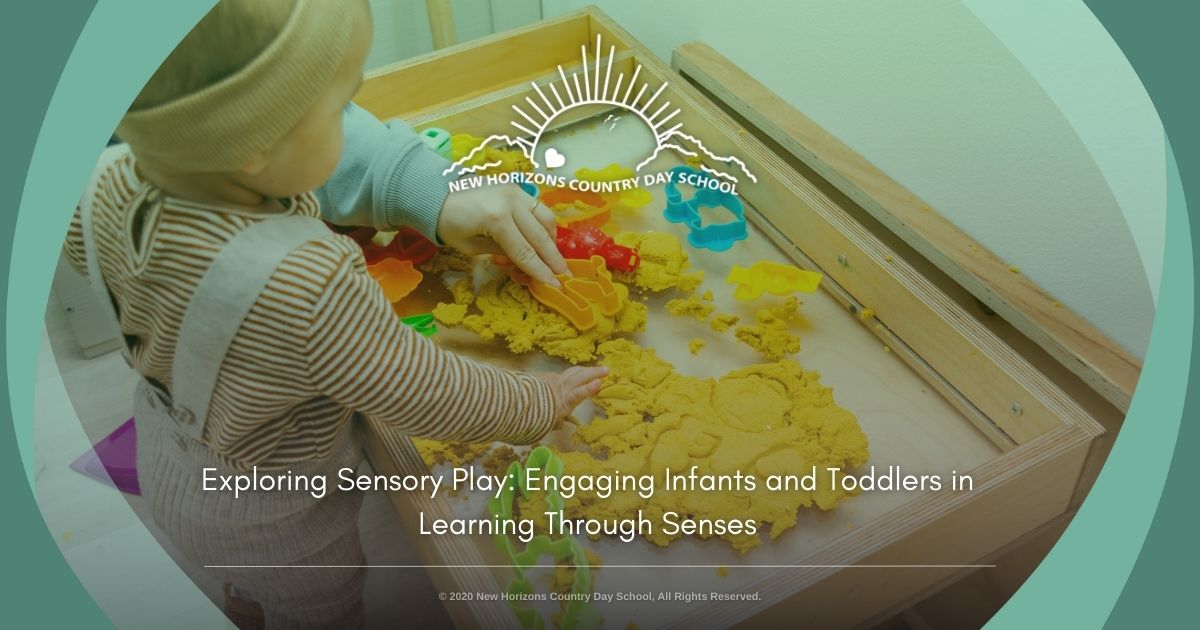
Babies are born ready to explore the world and learn about the people and things in their environment. Research shows children learn best when actively engaging in their education through hands-on activities. Interactive, hands-on learning engages the senses, keeps children active and engaged, and makes learning fun.
Infant and toddler programs must include plenty of fun, hands-on learning experiences that can help the youngest children build a foundation of critical skills. This article will explore the benefits of sensory play in early learning and how parents and educators can provide these experiences to the littlest learners in their lives.
Reach out to the caring educators at New Horizons Country Day School now to explore our preschool programs or schedule a tour of our incredible school. We look forward to welcoming your family to our center soon
What Are the Benefits of Sensory Play For Infants and Toddlers?
Sensory play can be fun, engaging, loud, and messy. Kids love getting their hands dirty and expressing themselves during hands-on play activities. But did you know sensory activities are actually the best way to help young children build essential school-readiness skills?
Here are some of the most important benefits of sensory play for infants and toddlers.
Developing the senses
Infants and toddlers need to see, smell, touch, taste, and hear a wide variety of things to create a basic understanding of their environment. Young children explore the world through their senses, and sensory play can help refine these skills. Many fun, engaging sensory activities even let kids use more than one sense at a time.
Motor skills
Infants and toddlers need to move their bodies in different ways to develop good gross and fine motor skills. Balance beams, swings, slides, and climbers let kids improve strength, balance, and gross motor control. Beads, paintbrushes, play-dough, and other fine motor activities help kids develop hand strength and dexterity they’ll need to hold a pencil, cut with scissors, and do other essential tasks in school.
Emotional development
Sensory play activities can help kids develop better emotional control by giving them the tools to stay focused and calm.
Language skills
Sensory play provides lots of opportunities for questions and conversations with friends, caregivers, and teachers. Children build their vocabulary by being exposed to new materials, ideas, and activities.
Incorporating sensory play into your early childhood classroom–or at home–can have enormous benefits for young learners. It’s also a lot of fun!
Sensory Play Activities For Infants and Toddlers
Sensory play doesn’t have to be big, expensive, or elaborate to benefit young children. It’s easy to provide simple activities that engage the senses and introduce new concepts at home and in the classroom. Keep reading for some great ideas on how to create fun, engaging sensory play opportunities every day.
Sensory bins
Sensory bins contain items children can explore through sight, touch, and even smell. Some ideas of things to put in a sensory bin include:
- Natural materials, like snow, leaves, or sand
- Pasta, rice, beans, oatmeal, or other food items
- Cotton balls
- Small toys
- Seasonal items, such as miniature pumpkins, plastic holiday ornaments, or paper hearts
It’s crucial to consider the age of your children. Avoid small items that may be a choking hazard for children under three years.
Play-dough
Kids can scoop, smash, pinch, and build with play-dough. Scented play-dough provides an even richer sensory experience.
Simple baking
Baking with children can be a fun, engaging experience. Let kids help measure, scoop, and stir the ingredients. Talk about what you see, smell, and taste using descriptive words. Talk about the texture of different ingredients and how the appearance of the food changes during different steps.
Making music
Make simple musical instruments out of rubber bands, empty containers, rice, and more. Or, simply play child-friendly instruments like drums, shakers, and bells. Talk about each instrument’s sounds and practice keeping a steady beat to music.
Sand and water play
Sand and water play can provide lots of sensory experiences. Give kids cups, shovels, and other simple tools to explore–and let them make a mess.
Gardening
Gardening gives kids a chance to smell dirt, see the parts of plants, feel sunshine and rain, and (eventually) taste fruits, herbs, or vegetables. Go small by planting grass seeds in a plastic cup or plan a large-scale garden on the school grounds or at home.
Sorting
Sorting is an important sensory play activity that introduces young children to some essential math concepts. Give children multicolored pompoms, toys, or counters, and let them divide them by size, color, or shape.
Providing sensory play activities throughout the day at home and school can make learning fun and help young children get the most out of their time in preschool.
Learn More About Sensory Play
At New Horizons, sensory play is at the center of our childcare and preschool programs. Our dedicated educators provide developmentally appropriate hands-on learning experiences to children of all ages, letting them engage their senses, learn critical skills, and have so much fun. Reach out now to learn about our infant and toddler care programs in Palm Harbor or to schedule a site visit. We look forward to meeting you and your family.








